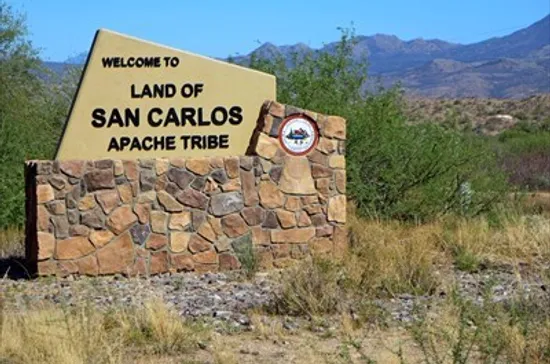
- Details
- By Native News Online Staff
On Tuesday, the San Carlos Apache Tribe signed a $1.5 million contract with the U.S. Department of Interior to develop water infrastructure on its reservation.
The historic signing has been more than 40 years in the making; in 1980, Secretary of Interior Cecil B. Andrus promised to deliver water to the reservation for agriculture and drinking water.
“This is a truly historic day,” San Carlos Apache Tribe Chairman Terry Rambler said in a statement. “We have waited 43 years for the federal government to make good on its promise to deliver Central Arizona Project water to our Reservation.”
The signing will initiate studies to deliver the Central Arizona Project (CAP), a 336-mile diversion canal in Arizona that allocates water from the Colorado River to the reservation. Currently, the Tribe gets water delivered from the Black River in Eastern Arizona and is looking for a more suitable alternative.
The Tribe says that the water will be used to replenish aquifers, increase agricultural development and revitalize its cattle industry.
Before the 1928 building of the Coolidge Dam, the San Carlos Apache was a leader in breeding Hereford cattle and produced tens of thousands of bushels of corn, wheat, and other food crops while operating a flour mill. The dam altered the reservation’s surrounding environment and, in turn, the Tribe’s economy.
“The construction of Coolidge Dam flooded our farms, destroying our agricultural economy,” Chairman Rambler said in a statement.
The Tribe estimates that the Bureau of Reclamation’s cost share will be at least $400 million. The Bureau will commit to three phases of work to be performed by both the Tribe and the department to complete an Environmental Impact Statement (EIS) for the water delivery system.
Building water infrastructure for the reservation is expected to create nearly 400 construction jobs and 200 jobs to operate and operate the water delivery and distribution system.
In December 2022, Native News Online reported that the San Carlos Apache Tribe is in agreement to lease up to 200-acre-feet—or 65 million gallons—of its CAP water allocation to meet the needs of the Rio Verde Foothills community near Scottsdale.
More Stories Like This
Gwich'in Tribal Governments Submit Comments Challenging Fish and Wildlife Service's Inadequate Environmental Review of Arctic Refuge Snow RoadRappahannock Tribe Challenges 9M-Gallon Water Plan
Feds release draft long-term plans for Colorado River management
Apache Leader Walks 60 Miles to Court Hearing That Will Decide Fate of Sacred Oak Flat
Rappahannock Tribe Raises Sovereignty and Environmental Concerns Over Caroline County Water Permit
Help us defend tribal sovereignty.
At Native News Online, our mission is rooted in telling the stories that strengthen sovereignty and uplift Indigenous voices — not just at year’s end, but every single day.
Because of your generosity last year, we were able to keep our reporters on the ground in tribal communities, at national gatherings and in the halls of Congress — covering the issues that matter most to Indian Country: sovereignty, culture, education, health and economic opportunity.
That support sustained us through a tough year in 2025. Now, as we look to the year ahead, we need your help right now to ensure warrior journalism remains strong — reporting that defends tribal sovereignty, amplifies Native truth, and holds power accountable.
 The stakes couldn't be higher. Your support keeps Native voices heard, Native stories told and Native sovereignty defended.
The stakes couldn't be higher. Your support keeps Native voices heard, Native stories told and Native sovereignty defended.
Stand with Warrior Journalism today.
Levi Rickert (Potawatomi), Editor & Publisher


